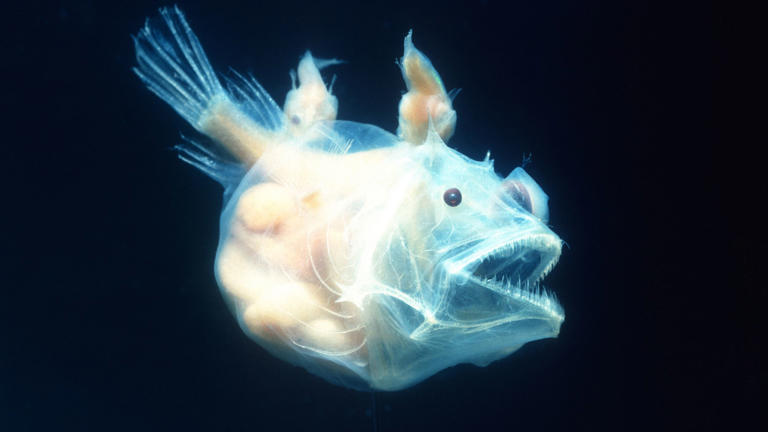





Anglerfish entered the midnight zone 55 million years ago and thrived by becoming sexual parasites
Anglerfish first colonized the ocean's midnight zone 55 million years ago, during a period of extreme global warming, a new study finds. The bizarre fish adapted to thrive in the deep sea by becoming sexual parasites, the researchers said.
These fish, in the order Lophiiformes, are among the most diverse vertebrate groups in the deep sea, having assumed a myriad of forms. Among their most recognizable features are their bioluminescent lures. The light from these dangling organs entices prey, drawing them within inches of a nightmarish array of needle-like teeth.
Many anglerfish species patrol the benthic, or seafloor, zone, ranging from the near shore to depths of thousands of feet. They walk along the bottom using modified fins that resemble legs. But others live in deep open water of the bathypelagic, or midnight zone, 3,000 to 13,000 feet (900 to 4,000 meters) below the surface.
A new study, published Jan. 15 on the preprint server BioRxiv, suggests anglerfish of the group Ceratioidea colonized the midnight zone during the Paleocene-Eocene Thermal Maximum, which occurred 55 million years ago and lasted for around 200,000 years.
This period may have been initiated by volcanic events that released methane into the atmosphere. The temperatures were so extreme, polar seas reached temperatures of up to 73 degrees Fahrenheit (23 degrees Celsius), while tropical sea surface temperatures may have gotten as warm as 97 F (36 C).
The event wiped out numerous deep-sea organisms and likely opened up new ecological niches. And ceratioid anglerfish, it appears, were primed to take advantage of them thanks to a set of unique adaptations, the researchers revealed.
Most ceratioid anglerfish diverged from their more-coastal cousins 50 million to 30 million years ago, aligning with these climatic shifts.
"What we found is that they went into the deep ocean, much like whales going back into the ocean from walking ancestors," lead author Chase Brownstein, a first year graduate student at Yale, told Live Science. "Anglerfish just did it in reverse. They were walking on the ocean floor and they went back up into the water column."E
Living in the midnight zone means having no real home — there are no reefs, caves, seaweed or other substrate to grasp onto. This lifestyle is not conducive to finding a mate, but the researchers suggest anglerfish adopted new breeding strategies to thrive in this featureless landscape.
Firstly, they seem to locate each other by scent.
"The males have these giant nostrils. It's very sci-fi. We think they're picking up on pheromones," Brownstein said.
When an anglerfish does encounter a potential partner in the darkness, it doesn't want to let go. Sometimes, males temporarily attach to females, which are significantly larger. "The dimorphism is ridiculous," Brownstein said. "Males are 1/100 the size of females in some cases."
And sometimes the males fuse to their partners permanently — that is, the males are sexual parasites, merging with females' bodies. In some species, only one male fuses with the female. In others, multiple males may attach to the female.
This unique reproductive strategy is the result of immune system deficiencies. Typically, the adaptive immune system would recognize and destroy foreign cells. But the loss of these immune functions — the generation of certain antibodies for example —enables the female to accept the male as part of her own body, feeding him with her blood supply. He in turn serves as a permanent sperm bank.
The researchers believe that the degeneration of the immune system and its facilitation of sexual parasitism were advantageous during this period of radical ecosystem upheaval, allowing anglerfish to head off into the featureless depths and diversify into the array of Lovecraftian creatures that stalk the midnight zone today.
"I think this might be an example of what's called exaptation, which is the idea that traits that don't have a clear positive adaptive role are later expressed in a new context and do provide an adaptive role," Brownstein said.
Reference: Live Science:


 How to resolve AdBlock issue?
How to resolve AdBlock issue?